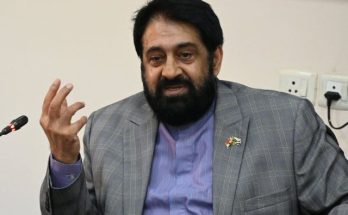Life imitates art sometimes. Vikas Swarup is a diplomat and not a gambler, but his debut novel Q and A, published last year by Random House, has scored big in literary sweepstakes winning him not only a huge advance and handsome royalties but also a much-coveted literary award in South Africa — the Boeke Prize. Q and A — the story of a penniless waiter who wins a mega quiz prize by finding answers to tricky questions embedded in the texture of his life itself — has been translated into many languages, including French and Hindi. The novel is also being made into a film.
In this interview with IndiaWrites (www.indiawrites.org), Swarup speaks from Durban about his tryst with literary celebrity, how the idea of writing a novel based on a popular quiz show struck him and the increasing global appeal of Indian Writing in English.
The reason for the novel’s global appeal, I imagine, is that though it is set in India, the issues it deals with – love, loss, friendship and humanity – are relatable to every culture and community.
I wanted to show that knowledge is not the preserve of the educated elite and that even a ‘street-kid’ can possess the wisdom to win a quiz show. For me the quiz show was also a good template to tell the story of modern India, through a series of interlocking stories.
There is a new hunger for all things Indian, whether it is Indian food or Indian ICT experts or Indian books. One reason for the appeal of IWE is that our stories deal with very elemental, very fundamental issues. And there are so many stories in our nation of a billion people, that we will never run out of ideas.
Q) How does it feel to be the first Indian writer to win the Boeke Prize?
A. It is indeed a great honour. In fact the field this year was so strong – I was up against books by Jonathan Saffron Foer, Scott Turow, Elizabeth Kostova, Marina Lewcyka and three other authors – that I thought I didn’t stand a chance. The fact that an ‘Indian’ book won is proof that readers love a good story, regardless of where it is set. I may be the first Indian to win the Boeke Prize but I am sure I won’t be the last.
Q) Your debut novel has been quite a success. How do you see Q and A?s spectacular success – is it the life-as-lottery motif that tapped into popular fantasies of becoming instant millionaires?
A. My novel is rooted in India and written in an “Indian” idiom. So the fact that it is now being translated into 30 languages has come as a pleasant surprise. The reason for the novel’s global appeal, I imagine, is that though it is set in India, the issues it deals with – love, loss, friendship and humanity – are relatable to every culture and community. In reality, Q & A could be set in Mexico or Bangkok or London – the themes and the emotions evoked are universal and the underlying message is a simple one – of creating your own luck, of the underdog beating the odds and winning!
Q) What’s you next novel about? When is it likely to be published?
A. I am still conceptualizing it. But it will also be a ‘social thriller’ like Q&A and should be ready for publication by 2008.
Q) You have eschewed the temptations of magic realism and written a plot-heavy novel pivoted around a popular quiz show. Was it a conscious choice or you just found your way into the story?
A. I wanted to write something off-beat. I did not want to write a generational family saga or a magical realist fable with talking monkeys. And then it struck me, why not tap into the global phenomenon of the syndicated televised quiz show. After all, ‘Who Wants to be a Millionaire’ was a top rated show in 110 countries across the world, including India.
I had also come across this news report of slum children – who had never read a newspaper, never gone to school – using a mobile internet facility. This led me to juxtapose the quiz show format with the life story of a rather untypical contestant – an eighteen year old penniless waiter living in the biggest slum in Asia. I wanted to show that knowledge is not the preserve of the educated elite and that even a ‘street-kid’ can possess the wisdom to win a quiz show. For me the quiz show was also a good template to tell the story of modern India, through a series of interlocking stories.
Q) Q and A has been translated into French. Is there a plan to translate it into some Indian languages?
A. It has already been translated into Hindi. The Gujarati, Marathi and Punjabi versions are also on their way.
Q) How do you juggle your career as a diplomat and your passion for writing?
A. I don’t see any conflict between my diplomatic career and my responsibilities as an author. It?s just that I can only write in my spare time. But perhaps because I have the security of a job, I find it easier to write.
Q) Is Indian English writing popular in South Africa? What do you think account for its cross-cultural appeal?
A. I think Indian English writing is popular not just in South Africa but all over the world. There is a new hunger for all things Indian, whether it is Indian food or Indian ICT experts or Indian books. One reason for the appeal of IWE is that our stories deal with very elemental, very fundamental issues. And there are so many stories in our nation of a billion people, that we will never run out of ideas.
Author Profile

- Manish Chand is Founder and Editor-in-Chief of India Writes Network (www.indiawrites.org) and India and World, a pioneering magazine focused on international affairs. He is CEO, Centre for Global India Insights, an India-based think tank focused on global affairs.
Latest entries
 India and the WorldDecember 12, 2025India-Italy bonding: Tajani’s visit raises the bar for business, maritime ties
India and the WorldDecember 12, 2025India-Italy bonding: Tajani’s visit raises the bar for business, maritime ties In ConversationNovember 26, 2025G20 is a Force for global Good
In ConversationNovember 26, 2025G20 is a Force for global Good articlesNovember 26, 2025Rescuing G20 from North-South divide: Ubuntu Moment
articlesNovember 26, 2025Rescuing G20 from North-South divide: Ubuntu Moment India and the WorldOctober 27, 2025Modi hails the century of India and ASEAN, backs ASEAN centrality
India and the WorldOctober 27, 2025Modi hails the century of India and ASEAN, backs ASEAN centrality







